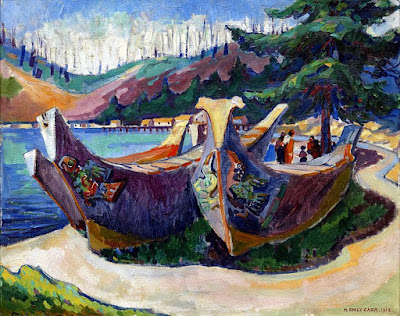It is getting crazy back in Canada. A third prominent editor has lost his job for dissenting on the issue of “cultural appropriation.” That’s Steve Ladurantaye, editor of
, and Hal Niedzviecki of the Writers’ Union.
Most disturbing is how all three needed to publicly apologize for their opinions, before being fired or resigning anyway. It is all like the public confessions under Stalin, like the Maoist purges, or like Ingsoc in 1984. You had to die; but only once you had fully admitted your thought crimes and professed your love for Big Brother. Ladurantaye will even apparently have to undergo reeducation sessions.
Yet—and perhaps this was the true nature of their crime—the point made in Niedzviecki’s original editorial was just about self-evidently true, if anyone read it.
He pointed out that without cultural appropriation, it would be first and foremost “indigenous” authors who would be unable to write. They, more than any of us, are trying to understand and offer insights into a culture not their own.
 |
| Iroquois appearing at exhibition in Buffalo in 1914, with traditional feathered headdress and traditional teepees. |
To begin with, they are writing in English about a culture the language of which was not English. In doing this, they are showing one culture through the prism of another. And the prism into which they are appropriating is Canadian English-language culture, not some aboriginal one. I think it can also be taken almost for granted that their own first language is English, not Ojibwe or Cree. They are writing novels about a culture that new nothing of the novel, a European invention. They are writing about a culture that had no writing.
Because it had no writing, we know little or nothing about it. We or they. Their guess is about as good as yours or mine as to what it was, really. They are, fundamentally, modern Canadians like the rest of us. They have watched the same TV shows, seen the same movies, played the same video games. If they write of a separate Canadian aboriginal culture, they are making it up as they go along, not reporting of something that has been. Any of us could do that equally well, so far as our cultural context goes.
 |
| Joseph Brant in traditional Mohawk dress, 1820s. |
No cultural appropriation, no First Nations literature.
Choose one; you can’t have both.
Niedzviecki’s other point was that cultural appropriation is a good thing. Heck, it what fiction is in the first place: writing about experiences that have not actually happened to you. Accordingly, any objection to cultural appropriation is an objection to fiction writing itself.
 |
| Traditional Iroquois longhouse. Someone is making things up. |
And so any prize for literature--the Nobel Prize, lets say—is always a prize for cultural appropriation. While the usual advice to “write what you know” is sensible—when you do not, you run the risk of looking foolish to someone who knows the subject matter better than you—conversely, the ability to write convincingly about a person remote from your own experience is the mark of a truly fine writer.
Let’s consider a few examples:
Shakespeare almost always set his plays in a foreign locale; most often Italy. This was a natural draw for audiences, then as now: we want to see something new, something exotic. We want cultural appropriation, and without it books are boring. Other than Italy, Shakespeare wrote of Scotland, Denmark, Moors, Jews, ancient Romans, ancient Greeks, ancient Egyptians; and did a brilliant job of always understanding them from the inside. That was his greatness.
John Milton, devout Puritan, famously managed to get under the skin of the Devil himself, and see the creation from his point of view, in
Paradise Lost. An imaginative tour de force.
Jonathan Swift wrote of foreign lands in
Gulliver’s Travels, including Japan and Formosa, barely known at the time. Sinbad in the
Arabian Nights, Homer in the
Odyssey, Apollonius in the
Argonautica, Valmiki in the
Ramayana, the Chinese classic
Journey to the West, and a million other exotic tales have done the same. Starting with the
Epic of Gilgamesh, the first known work of literature in the world.
Culture is cultural appropriation.
There is Byron’s epic,
Don Juan. Byron could be accused of ignorance of the Spanish culture he appropriates: he rhymes “Don Juan” as if it were an English word. Yet it is still considered, rightly, his great work. And do you suppose Coleridge had really been to Xanadu, and met with Kubla Khan? And what of FitzGerald’s
Rubaiyat of Omar Khayyam?
Opera could not exist without “cultural appropriation."
Aida?
The Mikado? Disney’s animated fantasies follow the same formula: each an insight into the aesthetic of a different culture.
Ernest Hemingway’s
The Old Man and the Sea was another scandalous piece of cultural appropriation, which probably won him the Nobel Prize. John Steinbeck’s
The Pearl, seeing life through the eyes of Mexican peasants, was made into a celebrated Spanish-language film in Mexico. Pearl S. Buck won the Nobel for
The Good Earth, life through the eyes of Chinese peasants.
English-speakers can see themselves reflected in the writings of Joseph Conrad, a Pole, Vladimir Nabokov, a Russian, or in Jules Verne’s
Around the World in Eighty Days. Did either ever strike any of us as illegitimate on those grounds? Was it wrong of Samuel Beckett to write in French? Western Europeans see themselves interpreted by the Japanese in Miyazaki’s
Howl’s Moving Castle. Where was the uproar? Canadians have been appropriated in Proulx’s
The Shipping News. I saw no protest.
And then there is the genre of historical novels. All illegitimate, then?
The aboriginal writers might have cause to be upset, perhaps, if portrayals of native people in Canadian or world literature were insensitive or prejudicial. The issue would not be cultural appropriation, but there would be an issue of prejudice. This is not the case. Thanks to the noble savage archetype, images of the First Nations in our shared literature have almost always been highly flattering.
No, cultural appropriation is a problem for about the opposite reason. The problem is that “Indian culture” as it exists today is really not much different from mainstream culture. Mostly just the experience of poverty and welfare. This is why the difference must be exaggerated. It must be artificially maintained that nobody can understand or write about it who has not lived it.
But the proof of that is simple: do they? And have they, successfully? Which is to say, do people buy and want to read the books? If they could not, convincingly, there would be no need to protest “cultural appropriation.” To protest cultural appropriation is to admit that they can. Indianness is a profitable field to farm, literarily, it is a current and popular subject, and has always been popular with readers, and so, out of greed, some writers want to put a fence around it.
But we should not allow that. Not just because it is destructive of fiction as a form. Not just because it is destructive of culture. We should foremost because it is objectively immoral. We are all brothers, and ought to seek to understand each other. This fuss about “cultural appropriation”artificially emphasizes our differences.






























